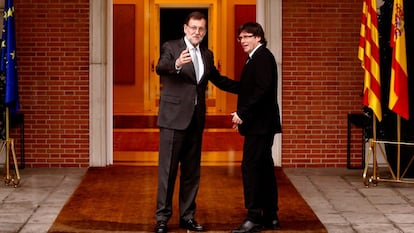Meeting between Spanish and Catalan leaders clouded by independence
Madrid-Barcelona talks had been on hold for nearly two years, but little progress was made Wednesday

The central and Catalan governments picked up relations again on Wednesday after nearly a two-year hiatus.
Spanish acting Prime Minister Mariano Rajoy and Catalan premier Carles Puigdemont met in Madrid on friendly terms, but came away without having found much common ground.
Both men are fundamentally opposed over the Catalan nationalists’ desire to hold a referendum on self-rule, which Madrid considers illegal.
“Without law, there is no democracy,” said Rajoy of the Popular Party (PP), echoing a position he has long held.
No surprise
Puigdemont did not seem shocked at the outcome.
“It is no surprise to say that there was no agreement. I didn’t expect any other kind of reaction, because we are separated by an abyss,” said Puigdemont, who rose to the premiership in an eleventh-hour assembly vote in January of this year, three months after Catalans had gone to the polls.
Court confrontation
The degree to which both goverments are at odds with each other is reflected in the fact that the Catalan executive has filed 49 appeals before the Constitutional Court, while the central government has filed 29. Rajoy said on Wednesday that this type of confrontation should be reduced in future.
His predecessor, Artur Mas, had maintained a similar verbal confrontation with Rajoy during his own term in office, which was marked by an informal independence referendum held on November 9, 2014.
Rajoy held his last meeting with Mas in late July 2014. All contact was severed after that, and the Catalan premier, who had held moderately nationalist views, fully embraced the independence movement from that point onward.
By the time Mas was replaced at the helm of the Catalan government by Puigdemont (after failing to secure enough parliamentary support to get himself reinstated, a position that Rajoy now finds himself in at the national level) relations were so strained that even a telephone conversation was out of the question.
On Wednesday, Rajoy and Puigdmont chatted for more than two hours inside La Moncloa palace’s Tapies room, a space usually reserved for top authorities. Rajoy also gave a press conference afterwards, something he had not done for over a month.
His speech was dotted with expressions such as “dialogue,” “working together” and “together, we are all winners.”
Enduring differences
But the public overtures of friendship could not disguise the enduring differences between both men.
Sign up for our newsletter
EL PAÍS English Edition is launching a weekly newsletter. Sign up today to receive a selection of our best stories in your inbox every Saturday morning. For full details about how to subscribe, click here.
“We support the idea that Catalonia is part of Spain and, like the vast majority of Spaniards, we feel this way and wish for us to stay together,” said Rajoy. “We are going to defend this political and personal position.”
Puigdemont, for his part, handed Rajoy a document with 46 demands, twice as many as Mas had brought to Madrid in July 2014. He insisted that he plans to take Catalonia “to the doors of independence,” but left room for dialogue.
“We will never walk away from the table, and if during this journey toward independence the government feels that it has an offer to negotiate the referendum, we will listen; we are ready to talk.”
The Catalan premier admitted that Rajoy had “listened” to all his proposals, but added that he sees “no possibility of an agreement – we stand at opposite extremes, and I expected no other reaction.”
Despite the lack of agreement, both leaders suggested a meeting of their deputies to analyze other issues, including how to deal with the refugee crisis, new regional financing rules, and investment in infrastructure.
English version by Susana Urra.
Tu suscripción se está usando en otro dispositivo
¿Quieres añadir otro usuario a tu suscripción?
Si continúas leyendo en este dispositivo, no se podrá leer en el otro.
FlechaTu suscripción se está usando en otro dispositivo y solo puedes acceder a EL PAÍS desde un dispositivo a la vez.
Si quieres compartir tu cuenta, cambia tu suscripción a la modalidad Premium, así podrás añadir otro usuario. Cada uno accederá con su propia cuenta de email, lo que os permitirá personalizar vuestra experiencia en EL PAÍS.
¿Tienes una suscripción de empresa? Accede aquí para contratar más cuentas.
En el caso de no saber quién está usando tu cuenta, te recomendamos cambiar tu contraseña aquí.
Si decides continuar compartiendo tu cuenta, este mensaje se mostrará en tu dispositivo y en el de la otra persona que está usando tu cuenta de forma indefinida, afectando a tu experiencia de lectura. Puedes consultar aquí los términos y condiciones de la suscripción digital.








































